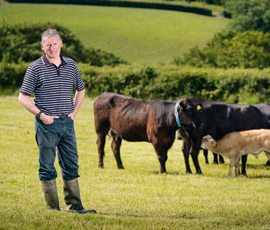Farmers Weekly Beef Farmer of the Year 2013: Phil Jones

Phil Jones
Lan Farm, Carmarthenshire
Pembrokeshire beef farmer Phil Jones is flying the flag for small family-run farms and is setting a shining example that they don’t have to struggle to survive. He is running a thriving low-cost, low-input business that epitomises simplicity.
His goal is simple – to develop a sustainable and profitable enterprise to safeguard the business for future generations. Consequently, Phil has made great strides to streamline input costs and fine-tune performance from the beef business. So far his strategy has paid dividends, with gross margins improving by £22,000.
| Farm facts |
|---|
|
| Winning ways |
|
His infectious enthusiasm, clear focus on profit, attention to detail and grassland management impressed all the judges.
Phil took the dramatic decision to switch to organic production more than a decade ago and this set the wheels in motion to limit inputs and maximise outputs.
“Output price can only be influenced by doing the best job of matching the customer’s requirements, and while sale price cannot be controlled, input costs can be focused to improve margins,” he says.
Good grassland management is at the heart of his system and despite being certified organic, he is making a concerted effort within constraints to promote forage quality and reduce concentrate spend.
He has reseeded leys with new varieties and also introduced red clover into a simple crop rotation to feed youngstock. P and K levels have been optimised, alongside the strategic use of lime and manure to boost soil fertility and support high-yielding crops.
“Phil has clearly identified the targets for efficient and profitable suckled calf production and has exceeded them by adopting the science of beef production with his focus on genetics, health and nutrition.”
Simon Marsh
Senior beef lecturer, Harper Adams University
Significant improvements have also been made to herd performance. By embracing technology and pioneering automated heat detection, fertility has been improved massively and calving index has been reduced from 409 to 377 days in the past four years.
Herd health is paramount and Phil has adopted a comprehensive health plan that is put into practice at every possible level.
The herd is part of the SAC Premium Cattle health scheme and is vaccinated for BVD and pneumonia. He also uses the tag-and-test system in newborn calves to identify animals persistently infected with BVD.
Changes to housing has resulted in a 70% reduction in medicine spend over the past three years.
Phil says one of his biggest mistakes in life was not attending agricultural college, but what he missed out on in education he has certainly made up for through his thirst for knowledge and determination to succeed.
He has gained a vast amount of knowledge since becoming a HCC and Farming Connect demonstration farm and also has strong links with the local community – welcoming students from local schools as well as agricultural and veterinary colleges.
Phil is also an advocate of improving ecology and as part of Glastir he is enhancing biodiversity.
Sponsor’s message
 “Phil is a shining example of how paying close attention to key management areas can improve both performance and profitability.”
“Phil is a shining example of how paying close attention to key management areas can improve both performance and profitability.”
Warren Anderson
McDonald’s
Nominate someone else or enter yourself for the 2014 Farmers Weekly Awards.
